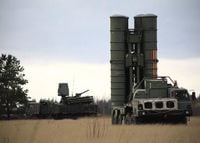On the evening of May 6, 2025, a series of explosions rocked the Crimean peninsula, with reports of missile attacks leading to widespread alarm among local residents and officials. The events unfolded shortly after an air raid alert was declared in Sevastopol, as Russian authorities claimed that the region was under a massive missile attack, allegedly involving Neptune missiles.
According to local Telegram channels, the alert was issued around 21:30 Kyiv time, with explosions reported in various areas, including Sevastopol, Alupka, Sudak, and Feodosia. Mikhail Razvozhaev, the so-called governor of Sevastopol, confirmed the declaration of the air raid alert but provided little detail about the situation.
The Russian authorities quickly responded to the threat by blocking traffic on the Crimean Bridge and halting all maritime transport in Sevastopol. This move was part of a broader effort to secure the region amidst fears of incoming missile strikes. Local residents reported seeing rockets in the sky, with claims that air defense systems were engaged in intercepting the alleged Neptune missiles.
In a statement, Razvozhaev mentioned that the situation was serious but did not elaborate on the extent of the attacks. Meanwhile, Russian military sources indicated that their air defense systems were successfully shooting down missiles, although independent verification of these claims remains challenging.
As the night progressed, reports emerged of missiles targeting Novorossiysk and Sevastopol, with the situation escalating further. By 22:05, Moscow's mayor, Sergei Sobyanin, reported that three drones heading towards the capital were shot down, indicating a broader pattern of aerial threats facing Russia.
In the wake of these events, the Unified State System for the Prevention and Liquidation of Emergency Situations (RSChS) had previously notified residents in Russia about potential internet access restrictions for a week, coinciding with the Victory Day celebrations. This raised concerns regarding information dissemination during heightened military activity.
The tension in Crimea follows a series of drone attacks that have targeted Russian military installations in the area, with explosions reported in various settlements over the past few days. The Russian military has claimed to have intercepted numerous drones, but the exact outcomes of these engagements have often been disputed.
Residents of Crimea expressed anxiety over the repeated missile threats, with some calling for increased safety measures. The leader of the Crimean Tatar Mejlis, Refat Chubarov, urged the local population to consider relocating to safer areas due to the increasing frequency of attacks on military targets by Ukrainian forces.
Reports of explosions and air defense operations have been a regular occurrence in Crimea since the onset of the conflict, with many locals describing the situation as unprecedented. The Russian government has often downplayed the effectiveness of its military responses, leading to skepticism about official narratives.
As the situation continues to develop, it remains unclear how the Russian military will adapt to the evolving threats in the region. The ongoing conflict has intensified fears among civilians, prompting calls for better preparedness and safety protocols.
Meanwhile, the Russian military has raised interceptors from airfields in Belbek and Saki, further indicating the seriousness of the threat perceived by the occupying forces. The Kremlin's response to the missile threats and drone attacks will likely shape the security landscape in Crimea in the days ahead.
In a twist of irony, as the Russian military prepares for potential retaliatory actions, residents in Moscow reported issues with ATMs, adding to the chaos of the day. The juxtaposition of military alerts in Crimea and logistical difficulties in the capital underscores the multifaceted challenges facing Russia amid ongoing hostilities.
As the situation unfolds, the international community is closely monitoring developments in Crimea and the broader region, with analysts speculating on the potential implications for Russian military strategy and its impact on civilian life in occupied territories.
The events of May 6 highlight the precarious nature of security in Crimea, where military tensions and civilian safety concerns are inextricably linked. With the threat of missile attacks looming, the residents of Crimea are left grappling with the uncertainty of their safety and the future of their region.
As the world watches, the unfolding drama in Crimea serves as a stark reminder of the ongoing conflict and its far-reaching consequences, both for those directly involved and for the international community.

